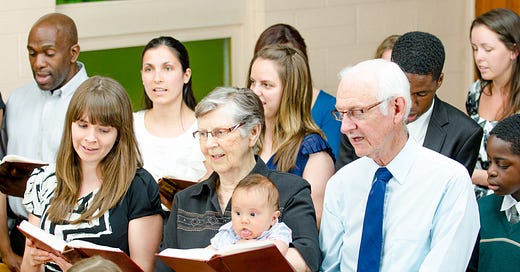Whose Responsibility is Faith Formation?
Understanding the Evolving Landscape of Christian Education in Congregational Settings
For decades, the role of the “Minister of Christian Education” held a prominent place within church leadership structures, serving as a central figure in shaping the spiritual growth and theological understanding of congregations. However, the landscape of church ministry is undergoing a significant shift, leading to a re-evaluation of how churches approach the vital task of nurturing disciples. The traditional, dedicated role of the "Minister of Christian Education" appears to be evolving, with several interconnected factors contributing to this shift in congregational leadership and focus.
Trends in Congregational Faith Development
One thing we're seeing is a move towards different job titles in churches. You might not see "Minister of Christian Education" as much anymore. Instead, churches in both evangelical and mainline traditions seem to be using more modern titles that better describe a wider view of discipleship and spiritual growth. Think roles like "Minister of Faith Formation," "Small Groups Pastor," or even "Family Life Pastor" – these often include the educational responsibilities of this traditional role.
Then there's the practical side of things – church staffing and how roles are handled. Sometimes, due to financial pressures especially in mainline denominations where membership has been declining, churches have fewer staff positions overall. When this happens, the responsibilities that used to belong to a "Minister of Christian Education" might get combined with another existing role, like an associate pastor also overseeing adult discipleship, or just get spread out among the remaining staff.
Finally, there's a clear trend of empowering the laity to take on leadership in Christian education. Across both evangelical and mainline churches, there's a real push to educate and equip everyday church members to lead in various educational ministries. This isn't just about filling gaps when there aren't enough staff; it also reflects the idea that spiritual growth often happens best in relationship with others.
Implications for Congregational Health and Vitality
These shifts in how churches approach faith formation can have some pretty significant effects on the overall health and vitality of our congregations. While sharing the responsibility for Christian education has some obvious upsides, especially when it comes to getting more people involved, it also comes with potential downsides, if we're not careful and intentional.
One potential issue is that the level of expertise and focus on education might decrease. When lots of people share the responsibility, individuals might not have the specific training, passion, or time needed to really develop and put into practice effective teaching strategies and resources. Pastors, for example, already have a ton on their plates, and while teaching is important, they might not have the capacity to create detailed curricula or provide in-depth training to help volunteer teachers.
Another worry is the lack of a clear, coordinated plan. Without someone (or a team) specifically focused on the big picture of Christian education in the church, efforts can become scattered and lack cohesion. Different ministries might do their own thing without a common thread, which could lead to gaps in what people understand theologically and a disjointed path for spiritual growth.
It can also become harder to tell if our Christian education efforts are actually working. Without a central point of oversight, it's tough to know what's being taught, how well it's being received, and whether it's leading to real spiritual growth and change in people's lives. We need to know way more than whether church members “liked” an event. This lack of evaluation can make it difficult for the church to see where it needs to improve.
Finally, there's the risk of overlooking the specific needs of adult learners. With a lot of focus often on children's and youth ministries due to the persistent belief that they will help grow the church, the unique learning styles and spiritual growth needs of adults can easily be forgotten. Adults, often the largest population in the church pews, need intentional and targeted approaches too, and these might get lost in a more general model.
Ultimately, the changing landscape of Christian education in the church means we really need to focus on equipping whoever is now responsible for helping people grow in their faith. Whether it's the pastor juggling everything or dedicated staff and volunteers taking on new educational roles, good training is essential. Otherwise, we risk the potential downsides of a more diluted approach - like a lack of coordination, less expertise, and not knowing if we're making a difference, which can ultimately hurt the spiritual growth we're trying to encourage. Investing in developing these leaders isn't just a good idea; it's crucial for the health and theological strength of the church moving forward.
For churches and denominations seeking to empower their staff and lay leaders in effective Christian education and discipleship, Tumbuh Global offers a range of training and workshops designed to cultivate confident and capable leaders. Our resources for church leadership can be found here. To explore how Tumbuh Global can partner with your denomination or church, please contact us through the website or email us at info@tumbuhglobal.org. Subscribe for free to receive new blog posts and details on downloadable resources.



